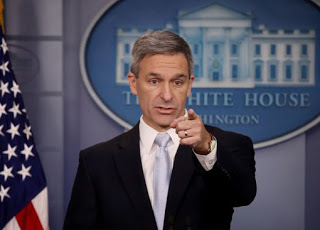Rule expanding definition of ‘public charge’ criteria to Medicaid draws fire from hospitals and advocates for immigrant families

Acting Citizenship and Immigration Director Ken Cuccinelli announced the final rule at a White House press conference.
—–
Adult immigrants would find it harder to remain in the United States if they signed up for Medicaid benefits, under a rule that the Department of Homeland Security finalized Aug. 12.
The rule “is in some respects not as harsh as the proposed rule released last fall,” Romoser writes. “The administration backed off its proposal to penalize immigrants who receive Medicare Part D low-income subsidies, and it also decided not to penalize immigrants who receive Medicaid while they are pregnant or under the age of 21.”
“The Trump administration said the rule will better enforce provisions in immigration law meant to deny permanent legal residency to any immigrant likely to become a ‘public charge,’ a term used for people who depend on government assistance,” Romoser reports. The term has been used as a criterion since Congress passed the first immigration law in 1882.
However, the term has historically “focused on cash welfare programs, Romoser notes. “The new rule broadly expands the definition to include food stamps, housing vouchers and Medicaid. Under the rule, even a short stint on Medicaid could doom an immigrant’s chance to remain in the country legally, immigration advocates say.”
 |
| Kaiser Family Foundation chart; click on it for a larger version |
Critics fear a chilling effect on immigrants with U.S.-born children, who are citizens. “Enrolling their children in Medicaid is not supposed to trigger any penalties,” Romoser reports, “but widespread fear about the rule is already causing many immigrant families to avoid seeking Medicaid or any other government assistance even for children who are U.S. citizens, stakeholders say.”
“Researchers at the Georgetown University Center for Children and Families said in a May report that fears in the immigrant community contributed to a 2.2% decline in children enrolled in Medicaid and CHIP last year,” Romoser notes. “In an analysis of the proposed rule, the Kaiser Family Foundation estimated that between 2.1 million and 4.9 million Medicaid and CHIP enrollees living in a household with a noncitizen would disenroll from the insurance programs.”
Ken Cuccinelli, acting director of U.S. Citizenship and Immigration Services, said at a White House announcement, “President Trump’s administration is re-enforcing the ideal of self-sufficiency and personal responsibility, ensuring that immigrants are able to support themselves and become successful in America.”